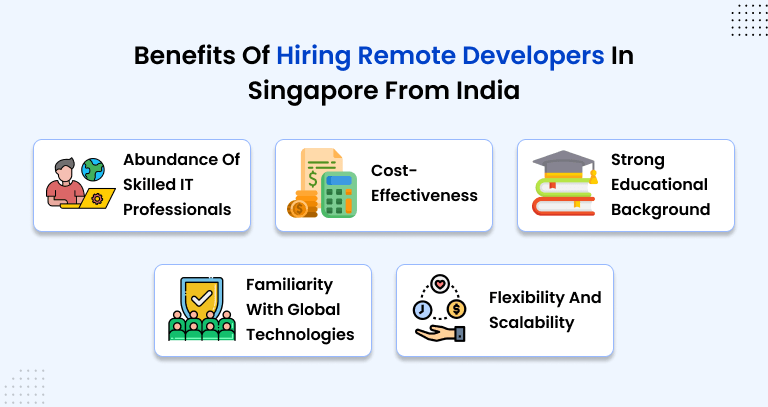In recent years, the global workforce has undergone a significant transformation, driven by advancements in technology and changing attitudes toward work. One of the most notable shifts has been the rise of remote work, enabling businesses to tap into a vast pool of talent from around the world. Singapore, known for its vibrant tech scene and strong digital infrastructure, has become a hotspot for hiring remote developers in Singapore.
Singapore’s Population and Cost Considerations:
Population:
Singapore has a population of approximately 5.7 million people (as of 2022). Despite its small size, Singapore has managed to attract a diverse range of talent from around the world, creating a multicultural and cosmopolitan society.
Cost of Living:
Singapore is known for its high cost of living, which includes housing, transportation, and healthcare expenses. Employers should consider these factors when determining compensation packages for remote developers in Singapore. However, it’s essential to remember that higher costs often correlate with higher quality of life and infrastructure.
Remote Work Benefits:
Hiring remote developers in Singapore eliminates the need for relocation expenses and physical office space. This can result in cost savings for businesses, making it an attractive option for accessing Singaporean talent without incurring significant overhead costs.
Benefits of Hiring Remote Developers in Singapore From India

When it comes to hiring remote developers, the partnership between Singapore and India has proven to be highly beneficial. We will explore the advantages of hiring remote developers in Singapore from India, highlighting why this collaboration is a winning strategy for businesses.
The abundance of Skilled IT Professionals:
India has long been recognized as a global leader in the IT industry. The country boasts a massive pool of highly skilled and technically proficient professionals, including developers, programmers, engineers, and designers. By hiring remote developers from India, businesses gain access to this abundant talent pool, ensuring a wide range of expertise and specialization for their projects.
Cost-Effectiveness:
One of the key advantages of hiring remote developers from India for Singapore-based businesses is cost-effectiveness. While Singapore is known for its higher cost of living, India offers significantly lower labor costs. This disparity in wage scales allows businesses to tap into top-notch talent at a fraction of the cost, resulting in substantial savings without compromising on quality.
Strong Educational Background:
India has a well-established education system that emphasizes technical skills and produces a large number of qualified IT professionals each year. Indian universities and institutes are renowned for their robust curriculum and rigorous training programs in computer science, engineering, and related fields. Hiring remote developers from India ensures access to a talent pool that has received a strong educational foundation, leading to high-quality outputs.
English Proficiency and Cultural Alignment:
English is widely spoken and understood in India, making communication with remote developers seamless and efficient. The proficiency of Indian developers in English eliminates language barriers and facilitates effective collaboration with Singapore-based teams. Moreover, India’s cultural alignment with Singapore, rooted in historical and business ties, ensures a smooth integration of remote developers into the work culture, minimizing cultural differences and promoting teamwork.
Overlapping Time Zones:
Singapore and India share a significant overlap in their time zones, making collaboration between businesses and remote developers highly convenient. This overlap facilitates real-time communication, enhances responsiveness, and ensures efficient coordination between teams. By hiring remote developers from India, businesses in Singapore can achieve round-the-clock productivity and minimize delays in project execution.
Familiarity with Global Standards and Technologies:
Indian developers have a strong reputation for their familiarity with global standards and cutting-edge technologies. They possess extensive experience working on diverse projects for clients worldwide, giving them exposure to the latest industry trends and best practices. Hiring remote developers from India ensures access to professionals who are adept at utilizing modern tools, frameworks, and technologies to deliver high-quality solutions.
Flexibility and Scalability:
India’s vast talent pool offers businesses a high degree of flexibility and scalability when it comes to hiring remote developers. Whether a project requires a small team or a large workforce, businesses can easily scale up or down by leveraging the talent available in India. This flexibility enables businesses to adapt to changing project requirements and optimize resource allocation effectively.
Hiring Stats for Singapore from India:
- Talent Pool: Singapore attracts a considerable number of skilled professionals from India. According to recent statistics, the Indian community in Singapore constitutes one of the largest foreign populations, with a diverse range of expertise, including software development and IT services.
- Education and Language Proficiency: English is one of the official languages in Singapore, making it an attractive destination for Indian developers. Singaporean universities also offer quality education, and many Indian students choose to pursue higher studies in Singapore, further expanding the talent pool.
- Competitive Salaries: While salaries for remote developers in Singapore may be higher compared to some other countries, they are competitive when considering the country’s high standard of living and robust tech ecosystem. Developers in Singapore can command salaries commensurate with their skills and experience.
What To Look For When Hiring Remote Developers in Singapore?
When hiring remote developers, it’s crucial to consider several factors to ensure you find the right candidates who can thrive in a remote work environment. Here are some key aspects to look for when hiring remote developers:
-
Technical Skills and Experience:
Assess the candidate’s technical skills and experience relevant to the role you are hiring for. Look for candidates with a strong background in the specific programming languages, frameworks, and technologies required for the job. Review their portfolio, previous projects, or contributions to open-source projects to gauge their proficiency and expertise.
-
Remote Work Experience:
Prior experience working remotely is valuable as it indicates the candidate’s ability to work independently, manage their time effectively, and communicate efficiently in a remote setting. Remote work requires self-motivation, discipline, and strong communication skills, so look for candidates who have demonstrated success in remote work or have the traits necessary for remote collaboration.
-
Communication Skills:
Strong communication skills are essential for effective collaboration in a remote team. Look for candidates who can clearly articulate their thoughts, actively listen, and respond promptly to inquiries. Assess their written and verbal communication skills during the interview process to ensure seamless remote communication.
-
Self-Motivation and Accountability:
Remote developers should be self-driven and able to manage their work without constant supervision. Look for candidates who demonstrate self-motivation, initiative, and a proactive approach to problem-solving. They should be able to prioritize tasks, meet deadlines, and take ownership of their work.
-
Adaptability and Learning Ability:
Technology is constantly evolving, so hiring developers who are adaptable and possess a strong desire to learn is crucial. Look for candidates who show a willingness to embrace new technologies, stay updated with industry trends, and continuously enhance their skills.
-
Collaboration and Teamwork:
While remote work often involves independent tasks, collaboration, and teamwork are still important. Look for candidates who can effectively collaborate with team members, contribute to discussions, and provide constructive feedback. Assess their ability to work in a distributed team environment and foster a positive team dynamic.
-
Problem-Solving and Critical Thinking:
Remote developers should have strong problem-solving and critical-thinking skills. They should be able to analyze complex issues, troubleshoot technical challenges, and propose innovative solutions. Assess their problem-solving abilities through technical assessments or case studies.
-
Cultural Fit:
Consider the candidate’s values, work ethic, and alignment with your company culture. While the cultural fit is important for any hire, it becomes even more crucial in a remote setting where team members may have limited face-to-face interactions. Look for candidates who share your company’s values and can easily integrate into your remote team.
By considering these factors, you can identify remote developers who not only possess the necessary technical skills but also have the qualities and traits required to thrive in a remote work environment and contribute to the success of your team and organization.

Conclusion:
Hiring remote developers in Singapore opens up a world of opportunities for businesses seeking top talent in the technology sector. With its skilled workforce, strong tech ecosystem, and cultural compatibility, Singapore offers an ideal environment for collaborating with remote developers. While considering the basic hiring statistics for Singapore from India, such as the talent pool, education, and competitive salaries, it is crucial to also factor in the population and cost considerations associated with living and working in Singapore. By embracing remote work and leveraging the global talent market, businesses can unlock a world of possibilities and drive innovation like never before.








